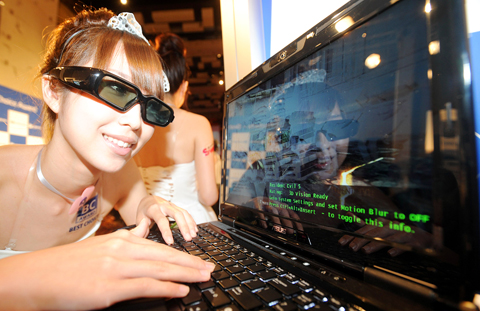Have you ever been rushing to your favorite musical or play only to discover the tickets you bought months ago have been left at home? Or are you sick of carrying all those coupons or membership cards in your wallet and digging them out every time you make a purchase?
Hsinchu-based Accuvally Inc (盈科泛利) says it has the solution.
The company offers electronic barcode solutions, and starting from August, almost 200 firms nationwide, especially those in the food and beverage sector, will start providing customers with such e-barcode services, Accuvally CEO Benjamin Lo (羅子文) said.

PHOTO: LIN CHENG-KUNG, TAIPEI TIMES
This means consumers just need to flash the e-coupon downloaded to their cellphone to enjoy discounts, or get a free scoop of ice cream, with the waiters scanning the e-barcode into the PC system. Best of all, the printed Broadway ticket may no longer be needed, as e-tickets can be stored in a cellphone.
Companies that will use Accuvally’s solution include NY Bagels Cafe, the Movenpick ice-cream chain, as well as sportsware retailer Sports Giant (尚智運動世界). A deal with Haagen Dazs ice cream is being negotiated, Lo said.
These applications and trends are among a sea of solutions to be showcased at Computex Taipei, the world’s second-largest and Asia’s biggest tech trade fair, which will open its doors tomorrow.
Taipei Computer Association (TCA, 台北市電腦公會), one of the event’s organizers, said in a statement released on Saturday that Computex is set to attract more than 35,000 international buyers to seal deals valued at US$20 billion this year.
The number of booths has increased by 8 percent this year to 4,861, the association said.
Running through Saturday at the Taiwan World Trade Center’s Xinyi and Nangang exhibition halls, this year’s Computex is expected to highlight products such as tablet PCs, e-book readers, cloud-computing technologies, 3D displays and various computer peripherals.
Acer Inc (宏碁), well known for its PC products, aims to impress international buyers with its K11 mini-projector.
The size of a man’s palm, the K11 is equipped with USB and SD card slots — meaning users just need to slot USB or memory cards into the machine, without the hassle of connecting it to a notebook.
It also supports high-definition multimedia interface, allowing it to be connected to LCD TVs for high-quality movies, or to the iPhones via an adapter for larger photo viewing, said Levise Lee (李幸堂), a specialist in Acer’s product marketing department.
With a brightness of 200 lumens, the projector offers viewers a sharp image of 152cm by 203cm, he said. The K11 was launched in Europe this month with a price tag of 349 euros (US$430).
Acer will be showcasing it at Computex and the projector will hit local stores next month.
“Consumers in Asia may not be familiar with our projectors, but we have been cultivating the sector in Europe for the past six years,” Lee said, adding that Acer is No. 2 in that market, trailing Japan’s Seiko Epson Corp.

IN THE AIR: While most companies said they were committed to North American operations, some added that production and costs would depend on the outcome of a US trade probe Leading local contract electronics makers Wistron Corp (緯創), Quanta Computer Inc (廣達), Inventec Corp (英業達) and Compal Electronics Inc (仁寶) are to maintain their North American expansion plans, despite Washington’s 20 percent tariff on Taiwanese goods. Wistron said it has long maintained a presence in the US, while distributing production across Taiwan, North America, Southeast Asia and Europe. The company is in talks with customers to align capacity with their site preferences, a company official told the Taipei Times by telephone on Friday. The company is still in talks with clients over who would bear the tariff costs, with the outcome pending further

A proposed 100 percent tariff on chip imports announced by US President Donald Trump could shift more of Taiwan’s semiconductor production overseas, a Taiwan Institute of Economic Research (TIER) researcher said yesterday. Trump’s tariff policy will accelerate the global semiconductor industry’s pace to establish roots in the US, leading to higher supply chain costs and ultimately raising prices of consumer electronics and creating uncertainty for future market demand, Arisa Liu (劉佩真) at the institute’s Taiwan Industry Economics Database said in a telephone interview. Trump’s move signals his intention to "restore the glory of the US semiconductor industry," Liu noted, saying that

NEGOTIATIONS: Semiconductors play an outsized role in Taiwan’s industrial and economic development and are a major driver of the Taiwan-US trade imbalance With US President Donald Trump threatening to impose tariffs on semiconductors, Taiwan is expected to face a significant challenge, as information and communications technology (ICT) products account for more than 70 percent of its exports to the US, Chung-Hua Institution for Economic Research (CIER, 中華經濟研究院) president Lien Hsien-ming (連賢明) said on Friday. Compared with other countries, semiconductors play a disproportionately large role in Taiwan’s industrial and economic development, Lien said. As the sixth-largest contributor to the US trade deficit, Taiwan recorded a US$73.9 billion trade surplus with the US last year — up from US$47.8 billion in 2023 — driven by strong

STILL UNCLEAR: Several aspects of the policy still need to be clarified, such as whether the exemptions would expand to related products, PwC Taiwan warned The TAIEX surged yesterday, led by gains in Taiwan Semiconductor Manufacturing Co (TSMC, 台積電), after US President Donald Trump announced a sweeping 100 percent tariff on imported semiconductors — while exempting companies operating or building plants in the US, which includes TSMC. The benchmark index jumped 556.41 points, or 2.37 percent, to close at 24,003.77, breaching the 24,000-point level and hitting its highest close this year, Taiwan Stock Exchange (TWSE) data showed. TSMC rose NT$55, or 4.89 percent, to close at a record NT$1,180, as the company is already investing heavily in a multibillion-dollar plant in Arizona that led investors to assume